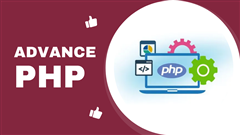
PHP Fundamentals: Your Path to Web Development Mastery
Welcome to our PHP Fundamentals course, your gateway to mastering the art of web development with PHP. Whether you're a complete beginner or looking to level up your skills, our course is designed to make learning PHP easy, engaging, and fun.
Course Overview:
Our PHP Fundamentals course is structured to provide a clear and practical understanding of PHP, covering everything you need to know to start building dynamic websites. With step-by-step lessons, interactive exercises, and real-world examples, you'll gain the confidence to tackle any PHP project with ease.
Curriculum Highlights:
Getting Started with PHP:
- Dive into the basics of PHP programming, including syntax, variables, and data types.
- Follow along with simple coding exercises to reinforce your understanding of fundamental concepts.
Working with Forms and User Input:
- Learn how to create dynamic web forms and handle user input securely.
- Explore techniques for validating and sanitizing user data to prevent security vulnerabilities.
Database Interaction with MySQL:
- Master the essentials of database interaction by integrating PHP with MySQL.
- Discover how to perform common database operations such as querying, inserting, updating, and deleting data.
Session Management and Authentication:
- Understand the importance of session management and user authentication in web applications.
- Learn how to implement secure login systems and manage user sessions effectively.
Introduction to Object-Oriented PHP:
- Get introduced to object-oriented programming (OOP) concepts in PHP.
- Learn how to create classes, objects, methods, and properties to organize your code more efficiently.
Exploring PHP Frameworks:
- Discover popular PHP frameworks like Laravel, Symfony, and CodeIgniter.
- Understand the benefits of using frameworks and how they can speed up the development process.
Course Benefits:
- Easy-to-Follow Lessons: Our course is designed with simplicity in mind, making PHP accessible to learners of all backgrounds.
- Hands-On Practice: Dive into practical exercises and projects that reinforce your learning and build real-world skills.
- Supportive Learning Environment: Our instructors are here to provide guidance and support every step of the way.
- Career Opportunities: Mastering PHP opens up a world of opportunities in web development and beyond.
- Community Engagement: Join a vibrant community of learners where you can connect, collaborate, and grow together.
Who Should Enroll:
- Beginners: If you're new to programming or web development, this course is perfect for getting started with PHP.
- Frontend Developers: Expand your skill set and become a full-stack developer by learning PHP alongside your frontend skills.
- Self-Learners: Take control of your learning journey and unlock your potential with our self-paced course structure.
Enroll Today:
Don't let the complexity of web development hold you back. Enroll in our PHP Fundamentals course today and embark on a journey towards mastering PHP. With our easy-to-follow lessons and supportive community, you'll be well on your way to becoming a confident web developer in no time. Join us and start building your future with PHP!



